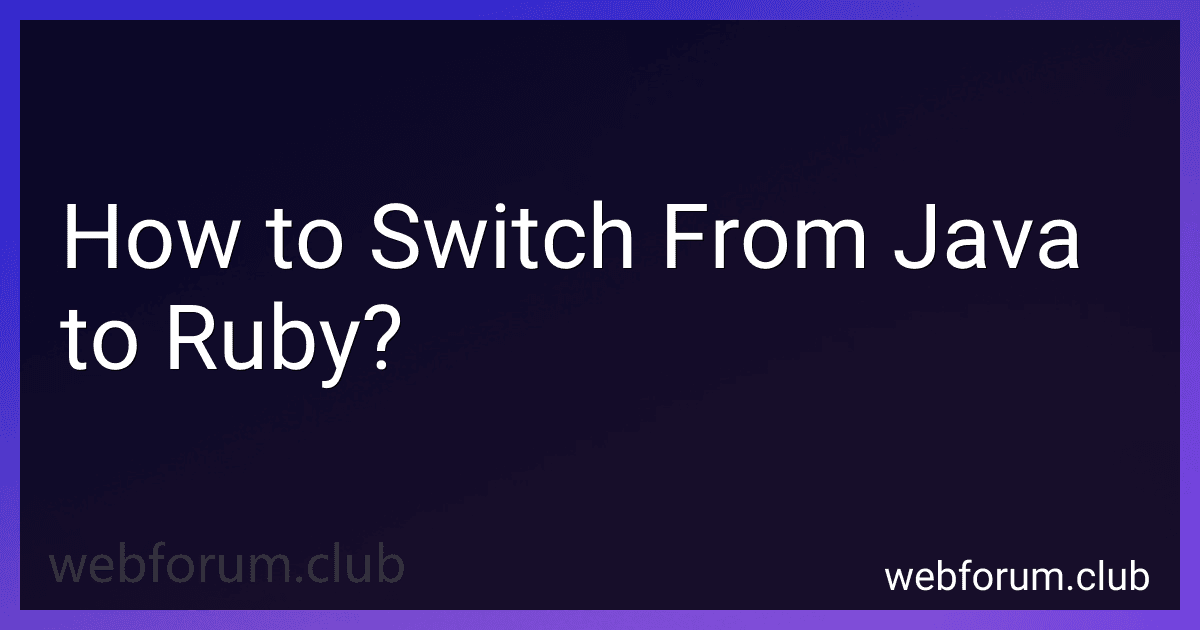Switching from Java to Ruby can be an exciting journey for developers looking to explore a different programming language. Here are some key aspects to consider when making the transition:
- Syntax: Ruby has a more compact and expressive syntax compared to Java, which often requires fewer lines of code to achieve the same functionality. Ruby uses dynamic typing, meaning you don't need to declare variable types explicitly.
- Object-Oriented Programming: Both Java and Ruby are object-oriented programming languages, so you'll find familiar concepts such as classes, objects, and inheritance in Ruby. However, Ruby uses a different inheritance model called "mixins" that allows for multiple inheritance-like behavior.
- Garbage Collection: Unlike Java, Ruby has automatic garbage collection, which means you don't need to worry about memory management like you would in Java. This allows you to focus more on writing code rather than handling memory allocation and deallocation.
- Gems: Ruby has a thriving community that has developed numerous third-party libraries and frameworks called "gems." These gems provide pre-built functionality and can significantly speed up development. The RubyGems package manager makes it easy to install and manage these gems in your projects.
- Metaprogramming: Ruby is known for its metaprogramming capabilities, allowing you to write code that writes code. This feature enables you to define and modify classes and methods dynamically during runtime, enhancing flexibility and productivity.
- Testing: Ruby has a robust testing framework called RSpec, which is widely used for behavior-driven development (BDD). Familiarizing yourself with RSpec and other testing tools in the Ruby ecosystem will help maintain code quality and ensure proper functionality.
- Community and Resources: Ruby has a vibrant and welcoming community, always ready to help and share knowledge. Joining online forums, attending meetups, and participating in open-source projects can provide valuable resources and networking opportunities.
As with any programming language switch, it's essential to practice and gain hands-on experience in Ruby. Start by working on smaller projects or migrating parts of your existing Java codebase to Ruby to gradually adapt to the language. Embrace the differences and leverage the unique features and strengths of Ruby to maximize your productivity and enjoyment as a developer.
What is the difference between Java and Ruby?
Java and Ruby are both popular programming languages, but they have some fundamental differences:
- Syntax and readability: Ruby has a more human-friendly syntax with a focus on simplicity and readability, making it easier for beginners. Java has a stricter syntax and requires more verbosity.
- Object-Oriented Programming: Both Java and Ruby are object-oriented languages, but Ruby follows a pure object-oriented model where everything is an object, even primitive types like integers. Java, on the other hand, combines object-oriented programming with procedural programming.
- Typing: Java is statically typed, meaning variables must be declared with a specific type and checked at compile-time. Ruby is dynamically typed, allowing variables to hold values of any type, and type checking occurs at runtime.
- Performance: Java is known for its strong performance and is often used for large-scale enterprise applications. Ruby has a reputation for being slower, but its focus is primarily on developer productivity and ease of use.
- Libraries and frameworks: Java has a vast variety of libraries and frameworks, making it suitable for diverse applications and industries. Ruby also has a good ecosystem of libraries and frameworks, with Ruby on Rails being a popular framework for web development.
- Industry Adoption: Java has been around for a long time and has a strong presence in the corporate world, especially for enterprise applications. Ruby is widely used in web application development, particularly with startups, small businesses, and in the Ruby on Rails community.
It's important to note that both Java and Ruby have their strengths and weaknesses, and the choice between them largely depends on the specific requirements of the project and personal preferences of the developers.
How to find Ruby libraries and frameworks for specific tasks?
There are several ways to find Ruby libraries and frameworks for specific tasks:
- Ruby Toolbox: The Ruby Toolbox (https://www.ruby-toolbox.com/) is a website that provides a categorized list of Ruby libraries, frameworks, and tools. You can search for specific tasks or browse through the different categories to find relevant options.
- RubyGems: RubyGems (https://rubygems.org/) is the default package manager for Ruby. You can search for gems related to your specific task by using the search function on the website. Each gem usually comes with documentation and usage instructions.
- GitHub: GitHub (https://github.com/) is a popular code hosting and collaboration platform. You can search for Ruby libraries and frameworks by using the search bar and specifying relevant keywords. GitHub also provides information about the popularity and number of stars a repository has, which can be an indication of its quality and usage.
- Ruby on Rails Guides and Resources: If you are specifically looking for libraries and frameworks for Ruby on Rails, the official Ruby on Rails website (https://rubyonrails.org/) provides guides and resources that list recommended gems and libraries for different tasks.
- Ruby Reddit and Forums: Online communities, such as the Ruby Reddit (https://www.reddit.com/r/ruby/) and various Ruby forums, can be valuable sources for finding recommendations and advice on Ruby libraries and frameworks. You can ask for specific recommendations and learn from the experiences of other developers.
When searching for libraries and frameworks, it's essential to consider factors such as compatibility with your Ruby version, documentation quality, and community support. Reading reviews, checking the project's activity and popularity, and experimenting with the libraries can help you make an informed decision.
What is the equivalent of Java's ArrayList in Ruby?
The equivalent of Java's ArrayList in Ruby is the Array class.
